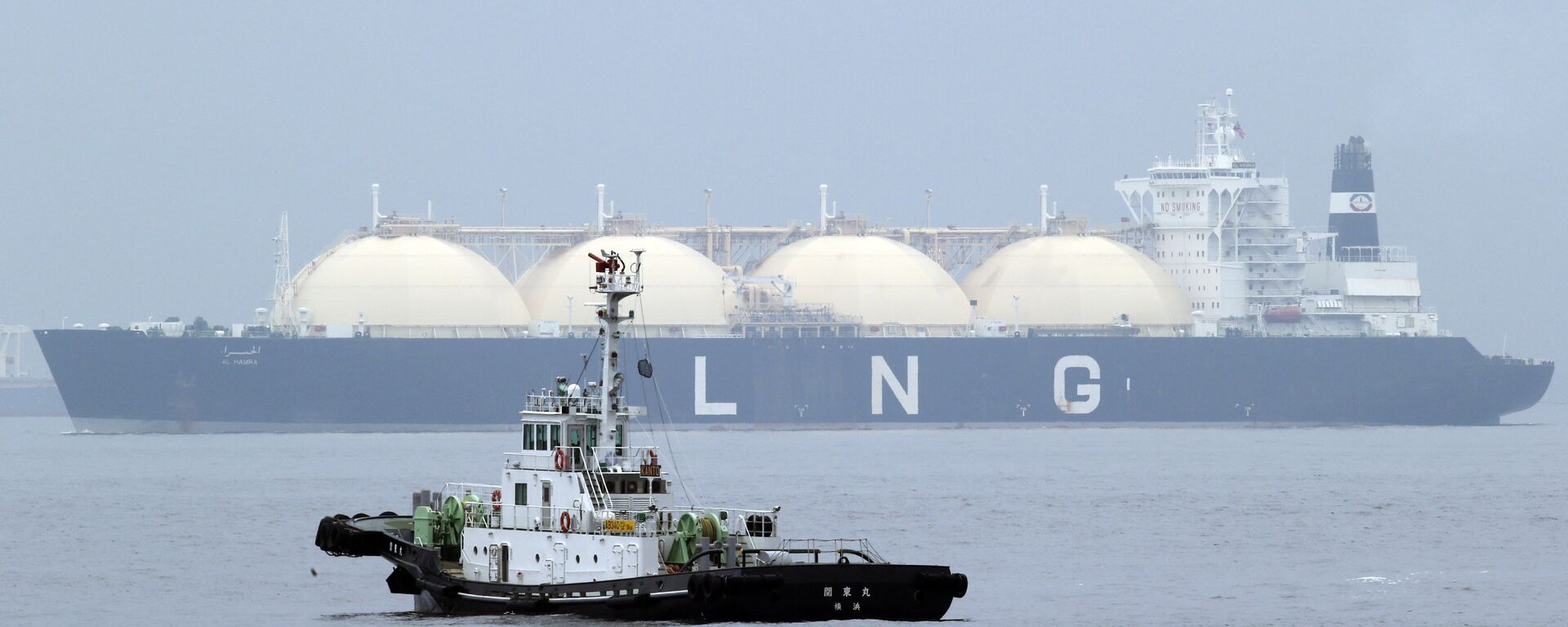https://sputnikglobe.com/20220920/experts-explain-how-germanys-anti-russia-sanctions-threaten-india-with-food-crisis-1101010511.html
Experts Explain How Germany's Anti-Russia Sanctions Threaten India With Food Crisis
Experts Explain How Germany's Anti-Russia Sanctions Threaten India With Food Crisis
Sputnik International
On April 4, German authorities took Gazprom Germania under temporary management, disrupting liquid natural gas (LNG) supply to India under a long-term... 20.09.2022, Sputnik International
2022-09-20T16:24+0000
2022-09-20T16:24+0000
2024-06-08T13:07+0000
lng
us
gail
germany
food crisis
coal
gazprom
narendra modi
nord stream pipeline
analysis
https://cdn1.img.sputnikglobe.com/img/07e6/09/14/1101015600_0:275:3030:1979_1920x0_80_0_0_93cbf779f8f3da10f48b0018a5cf4696.jpg
Gas supply disruption from Gazprom Germania has exacerbated the Indian government's woes as it left the state-run firm GAIL, which supplies 52 percent of the country's total gas demand, scrambling to find new suppliers.LNG shortages have triggered fears of a food and fuel crisis in the country.Bloomberg reported that GAIL purchased three LNG cargoes last week for over $40 per million British thermal units (mBtu) against $12-14 per mBtu. The Indian firm is scouting for more cargoes in the US and Gulf as the supply of 2.85 million tons of LNG from former Russian unit Gazprom Germania has been under suspension since May.The supply woes for India began after Russia stopped dealings with SEFE Marketing & Trading Ltd's parent Gazprom Germania after Germany's regulator seized control of the company in April.When signing the 20-year contract with GAIL, SEFE M&T was part of Gazprom Germania — a unit of Russia's Gazprom.GAIL sells around 42 percent of gas to the country's fertilizer units and over 20 percent to gas-based power units.Sources told Sputnik that GAIL has stopped supplying gas to power units and curbed supplies for fertilizer units.In May, the Modi government banned wheat exports and earlier this month announced a ban on rice exports to ensure ample foodgrain stocks for the 1.4 billion population. The Food Ministry said that it would restrict sugar exports as well on Monday.In April, India's Power Ministry directed power generation firms to start the function of gas-based power plants amid a record jump in electricity demand and coal shortages for the thermal power plants. However, gas supply disruption derailed the plan.Indian power and steel producers rushed to Russia and Australia to avert the threat of power outages across the country.Indian government data suggests that LNG imports in August fell by 19 percent on high prices and limited availability in the spot market.Asian gas buyers, including India, have to pay around $42 per mBtu for LNG in the spot market, lower than August's $70 mBtu. The spot prices are still three-four times higher than the prices India imports LNG under the long-term contract.Western sanctions are to be blamed for hampering pipeline deliveries to Europe, as Russia used to supply about 40% of the EU gas before February 24, when it launched the special military operation in Ukraine.Singh warned of higher LNG prices in the short-run as European countries are rushing to secure LNG contracts with Gulf producers at higher rates.Thermal power producers will also have to pay a higher amount for coal imports as thermal coal demand in Europe could be the highest in at least four years.Experts observe that energy buyers can do very little to bring down prices of LNG or other energy resources in the immediate future.
https://sputnikglobe.com/20220905/germanys-uniper-australias-woodside-agree-on-lng-supplies-to-europe-from-2023---company-1100411323.html
germany
Sputnik International
feedback@sputniknews.com
+74956456601
MIA „Rossiya Segodnya“
2022
Rishikesh Kumar
https://cdn1.img.sputnikglobe.com/img/07e4/08/04/1080055820_0:0:388:389_100x100_80_0_0_40018ee210946d65d49ffba4f4c008e1.jpg
Rishikesh Kumar
https://cdn1.img.sputnikglobe.com/img/07e4/08/04/1080055820_0:0:388:389_100x100_80_0_0_40018ee210946d65d49ffba4f4c008e1.jpg
News
en_EN
Sputnik International
feedback@sputniknews.com
+74956456601
MIA „Rossiya Segodnya“
Sputnik International
feedback@sputniknews.com
+74956456601
MIA „Rossiya Segodnya“
Rishikesh Kumar
https://cdn1.img.sputnikglobe.com/img/07e4/08/04/1080055820_0:0:388:389_100x100_80_0_0_40018ee210946d65d49ffba4f4c008e1.jpg
lng, us, gail, germany, food crisis, coal, gazprom, narendra modi, nord stream pipeline, gas, european union (eu), fuel
lng, us, gail, germany, food crisis, coal, gazprom, narendra modi, nord stream pipeline, gas, european union (eu), fuel
Experts Explain How Germany's Anti-Russia Sanctions Threaten India With Food Crisis
16:24 GMT 20.09.2022 (Updated: 13:07 GMT 08.06.2024) On April 4, German authorities took Gazprom Germania under temporary management, disrupting liquid natural gas (LNG) supply to India under a long-term contract. Now, reports say that India is purchasing LNG from another supplier at double the price it paid last year.
Gas supply disruption from Gazprom Germania has exacerbated the Indian government's woes as it left the state-run firm GAIL, which supplies 52 percent of the country's total gas demand, scrambling to find new suppliers.
LNG shortages have triggered fears of a food and fuel crisis in the country.
Bloomberg reported that GAIL purchased three LNG cargoes last week for over $40 per million British thermal units (mBtu) against $12-14 per mBtu. The Indian firm is scouting for more cargoes in the US and Gulf as the supply of 2.85 million tons of LNG from former Russian unit Gazprom Germania
has been under suspension since May.
"LNG prices have been setting fresh record highs for the past 12 months. The current spot market price is 5-6 times the historical price, which makes LNG unaffordable for lower-income countries such as India," Amit Bhandari, a senior fellow in the Energy & Environment Studies Programme at Gateway House, told Sputnik.
The supply woes for India began after Russia stopped dealings with SEFE Marketing & Trading Ltd's parent Gazprom Germania after Germany's regulator seized control of the company in April.
When signing the 20-year contract with GAIL, SEFE M&T was part of Gazprom Germania — a unit of Russia's Gazprom.
GAIL sells around 42 percent of gas to the country's fertilizer units and over 20 percent to gas-based power units.
"In India, gas consuming industries like fertilizer, refineries, power, steel and petrochemicals are being affected negatively due to higher LNG prices," Ravi Singh, vice president and head of research at Share India Securities, told Sputnik.
Sources told Sputnik that GAIL has stopped supplying gas to power units and curbed supplies for fertilizer units.
"The use of natural gas, which is cleaner among traditional fuels and is also projected as a transition fuel, is going to suffer. Moreover, higher gas prices also mean higher urea prices - which, in turn, will result in higher food prices. When hydrocarbon prices go up, food prices also increase," Bhandari said.
In May, the Modi government banned wheat exports and earlier this month
announced a ban on rice exports to ensure ample foodgrain stocks for the 1.4 billion population. The Food Ministry said that it would restrict sugar exports as well on Monday.
In April, India's Power Ministry directed power generation firms to start the function of gas-based power plants amid a record jump in electricity demand and coal shortages for the thermal power plants. However, gas supply disruption derailed the plan.
Indian power and steel producers rushed to Russia and Australia to avert the threat of power outages across the country.

5 September 2022, 20:48 GMT
Indian government data suggests that LNG imports in August fell by 19 percent on high prices and limited availability in the spot market.
Asian gas buyers, including India, have to pay around $42 per mBtu for LNG in the spot market, lower than August's $70 mBtu. The spot prices are still three-four times higher than the prices India imports LNG under the long-term contract.
"Prices increased sharply after the geopolitical crisis and supply-chain disruption from Russia. As winter is approaching, European buyers would be willing to pay high prices, directing most of the supplies of LNG towards it. Indian importers may be unable to source LNG amid supply curbs from Russia," Ravi Singh underlined.
Western sanctions are to be blamed for hampering pipeline deliveries to Europe, as Russia used to
supply about 40% of the EU gas before February 24, when it launched the special military operation in Ukraine.
Singh warned of higher LNG prices in the short-run as European countries are rushing to secure LNG contracts with Gulf producers at higher rates.
Thermal power producers will also have to pay a higher amount for coal imports as thermal coal demand in Europe could be the highest in at least four years.
Experts observe that energy buyers can do very little to bring down prices of LNG or other energy resources in the immediate future.
"In the longer run, they can invest in new LNG projects, which will increase the gas supply. Price is a signal - and usually, higher prices are a signal to companies to invest more in a particular sector. However, in the case of LNG, this signal is severely distorted by sanctions," Bhandari concluded.




